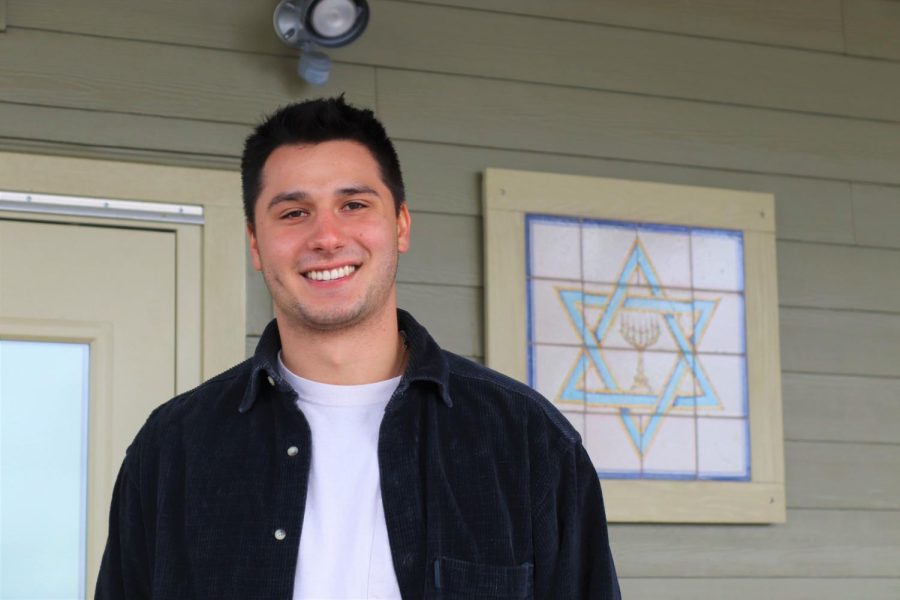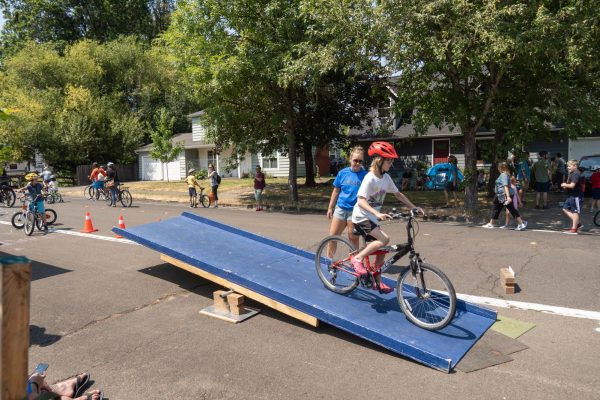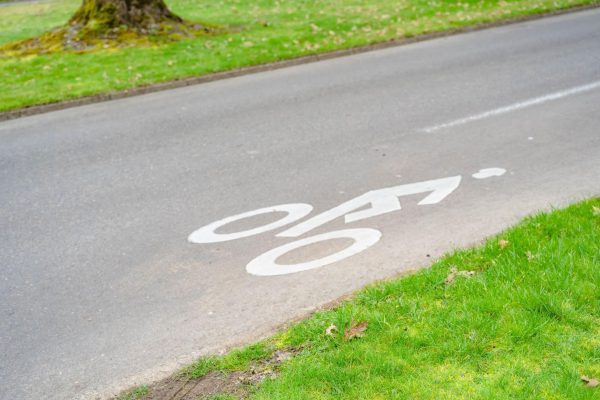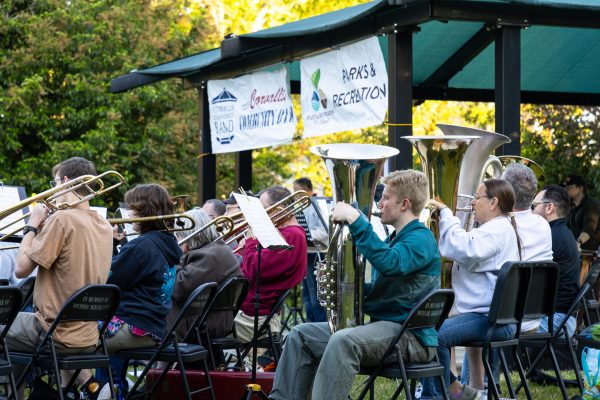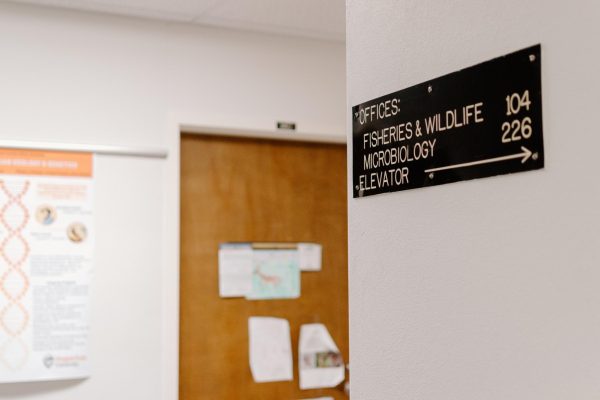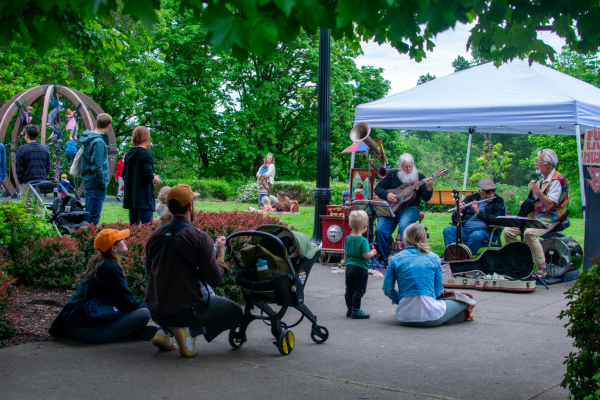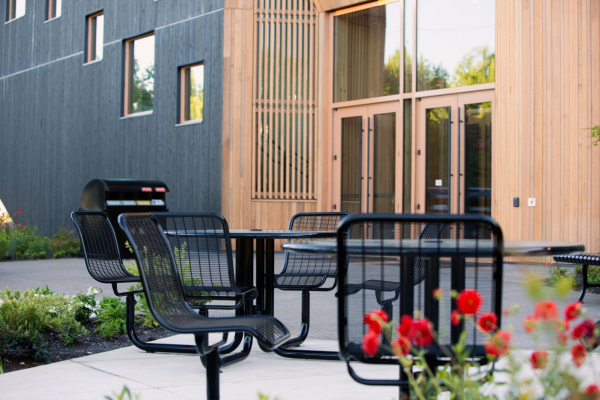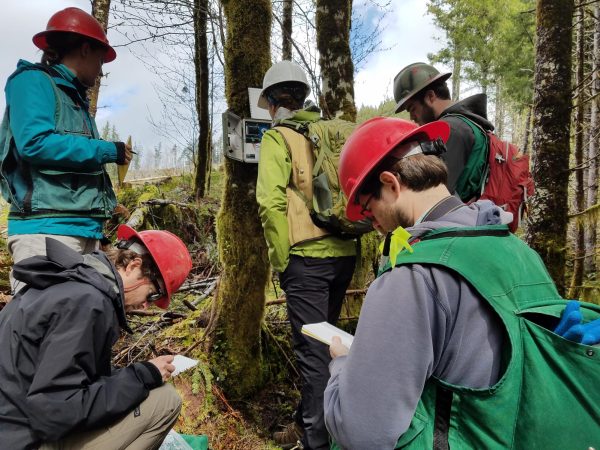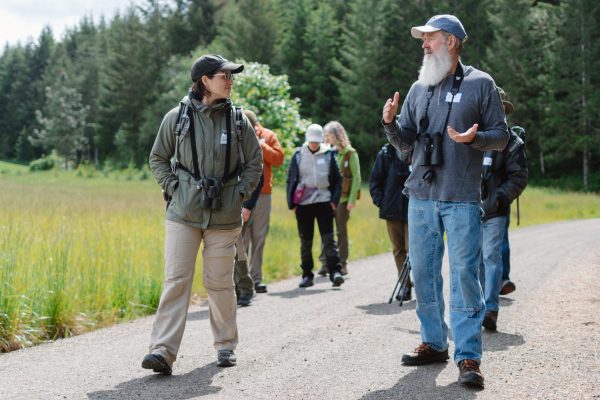Jewish American Heritage Month: local Corvallis Jewish residents speak on experiences, antisemitism
Oregon State University third-year student and Orange Media Network Assistant Sports Editor Benjamin Rabbino stands in front of Beit Am located in Corvallis, Ore. Rabbino was raised Jewish, and though he says he hasn’t experienced antisemitism at OSU specifically, he notes he has seen antisemitism off campus.
May 2, 2022
One in four Jewish people in the United States experienced antisemitic incidents in 2021, according to a report from the American Jewish Committee.
Forty percent of Jewish Americans in the survey said antisemitism was a very serious problem in the U.S. From 2021-2022, the Anti-Defamation League received five reports of antisemitic incidents in Oregon, ranging from graffitied swastikas in Lake Oswego, Ore. to targeted fliers directed at Oregon House Rep. Rachel Prusak in Portland, Ore.
Even small towns like Corvallis, Ore. aren’t free of antisemitic incidents.
Corvallis resident and Beit Am member Eliezer “Daniel” Froehlich said he was on the recieving end of antisemitic comments shouted at him from Oregon State University students who lived across the street from him at the time in May 2021.
Froehlich said he reached out to OSU about the incident and recieved a message from the office of the university president condemning antisemitism, but explaining they could not censor students. Froehlich said after he wrote to OSU, he believes each person was later confirmed to be an OSU student either by neighbors or roommates.
Froehlich said another OSU student from the same housing complex came to offer support and protection, if needed, even providing Froehlich with his phone number and apologizing on behalf of the students behaving inappropriately. He said a ROTC student also approached him to offer protection and support after the incident.
Froehlich also experienced antisemitism while a student at OSU. When he was a sophomore, he said there were twin sisters from Eastern Oregon who’d been taught by their parents that Jewish people have horns and tails and they really believed it. But Froehlich said the girls didn’t care and were still his friends.
“But it was so flabbergasting to me that even in the ’70s somebody could believe such a thing,” Froehlich said. “I couldn’t think they were serious.”
Froehlich said he played along for a while, telling the girls Jewish men wore Kippahs because the horns were too big to keep down. They were so unsure that he said he eventually took his Kippah off and let them feel his head to prove there were no horns.
Froehlich said his experiences with the community in Corvallis have otherwise been mainly positive, aside from a woman who spat in his yard and once returned with two men. He said it’s easy to tell he’s Jewish as he always wears his kippah, or yarmulke—a Jewish head covering for men—and sometimes it’s too warm to wear a hat over it.
According to Froehlich, Congregation Beth Israel in Portland, Ore. is the original Jewish reform congregation in Oregon. Froehlich said it made a big difference that Jewish people came to Oregon earlier than many other groups, eliminating much of the potential for bias incidents. He said instances of intstitutional antisemitism that did take place didn’t happen until around the 1920s, when one of the big country clubs in Portland, which had Jewish founders, stopped allowing Jewish people to become members.
An Oregon Encyclopedia article by Ellen Eisenburg explains that Beth Israel was founded in 1858 and erected its first synagogue in 1861 with enough seating for 200.
“Several factors fostered the acceptance of Jews […] The timing and composition of Jewish migration was key,” Eisenburg wrote. “Jews first arrived in Oregon in 1849, just years after the first Overland immigrants brought resettlers to the region.”
Eisenburg continued to say that no long-lasting Jewish congregations were established outside of Portland for the remainder of the 19th century, save for a burial service in Albany, Ore. and Jewish people living in the Willamette Valley often had to find their way to Portland to attend events and religious holidays.
Froehlich said early Jewish settlers intermarried with Indigenous people in the 1830s, and he has quite a few relatives from the Native American Chinook tribe who came down for his son’s Bar Mitzvah in Corvallis—a coming of age ceremony for boys—and did a drum ceremony in the field where Seventh Street Station was eventually built.
Comments like “Jew them down,” according to Froehlich, are often used by people who don’t even think about what they’re saying, par- ticularly in other parts of the country. He said he’ll often throw the comment back at them with something like “Jesus me down” to illustrate how inappropriate such comments are.
“It usually works without being confronta- tional,” Froehlich said. “But at the same time it points out to them that it’s not nice and it’s obnoxious. It seems to work without making a fight about it.”
Benjamin Rabbino, OSU third-year finance student and Assistant Sports Editor for The Daily Barometer, said he hasn’t found a Jewish community on campus and his experience as a Jewish man at OSU has been pretty “bland,” though he said this could be due, in part, to his lack of effort to seek out community.
Though he hasn’t been singled out for being Jewish or heard antisemitic comments on campus, Rabbino said he does occasionally hear negative jokes about Jewish culture off campus. Rabbino gave the example of “getting Jewed out of something,” which implies that Jewish people tend to cheat others out of their fair share or that they’re overly focused on money.
“Growing up, I was raised in a Jewish household and even went to a Montessori school at the same place where my family went to temple,” Rabbino said. “I had a Bar Mitzvah when I was 13 and that was one of the major moments of my life. Prior to the ceremony, I had to rehearse and prepare a lot, more than I ever had before at 13, to memorize and be able to read portions from the Torah.”
However, after his Bar Mitzvah, Rabbino explained his schedule became busier and he started losing interest in attending services in favor of spending more time with friends.
“From then, I have held the pride of being a Jewish male, learning and understanding the vast history behind the Jewish race and religion, while protecting that image with the way I live my life and how I hold myself,” Rabbino said. “Now, I check in on my parents any time a major Jewish holiday comes up and I say a small prayer with them, and I am hoping that as I get older, the more comfortable I feel connecting with religion again.”
According to Rabbino, antisemitic remarks and jokes are sometimes made with less caution than other racial slurs.
“People have obviously been told through their time growing up and gaining more experiences that any form of bigotry isn’t tolerated, but personally I have found many jokes becoming too personal,” Rabbino said. “There are stereotypes that come along with every race or religion, and someone is always going to have an opinion or something to say, and at times it feels as if there is nothing that I can do in the moment to stop someone from making those remarks again.”
Jewish students on other campuses have experienced casual and even aggressive antisemitism as well, even to the point of receiving death threats and being afraid to leave home or wear the Jewish symbol of the Star of David and traditional clothing like the yarmulke.
OSU holds an annual Holocaust Memorial Week, which had events that took place from April 25 through May 2 this year and featured speakers like Joe Hess, a Holocaust survivor, and Edward B. Westermann, a professor of history at Texas A&M University.
OSU also has a branch of Hillel, a club for Jewish students which is involved with the Alpha Epsilon Pi Jewish Fraternity and a Jewish LGBTQ+ club.
Andy Gitelson, executive director of Oregon Hillel, said Hillel provides opportunities for Jewish students including delivering matzo ball soup to students who may not be feeling well, hosting Shabbat gatherings, Monday meetups with the director of Jewish student life at JavaStop in the Memorial Union, Passover Seders and more. Gitelson added that a great way to connect with Hillel and stay up to date is via their Instagram, @oregonstatehillel.












































































































